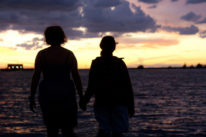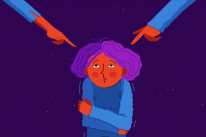
“When you begin to touch your heart or let your heart be touched, you begin to discover that it’s bottomless.” ~Pema Chodron
As a child I learned boundaries. I learned what I wasn’t allowed to talk about outside of the family. I learned how far I could go with my parents before I faced their disapproval. I also learned that this boundary was unpredictable.
Because it was unpredictable, I honed the ability to sense when it seemed safe to do something, and when I couldn’t, based on the emotions of those around me. It kept me safe for the most part. And, I learned to always be on guard around certain people.
As a result of some of these experiences, I was reluctant to let people into my inner world for fear that I would get hurt.
I used this ability to read others throughout my life, especially in my career. I could walk into a room and read the mood of the group or individual to ensure that I understood how far I could go.
For a few people in my life, these boundaries were appropriate. But I used them almost all the time.
Setting these boundaries also cost me.
It cost me because I didn’t trust others.
It cost me because I learned not to expect things from others or I would end up disappointed.
It cost me because I thought I needed to only rely on and trust myself.
What I saw in other people was really a reflection of my own lack of trust in myself.
All the time that I held firm boundaries, I thought they were about respecting myself. But they were really about fear.
I was afraid of letting others in. I was afraid of letting myself in. And, I discovered that I was main person who didn’t treat myself with respect. This was a difficult lesson.
It is a lesson I am still learning.
On the one hand, the skills that I honed in childhood served me well. They kept me safe. They kept me in what little control I had over my life. I couldn’t control much, but I could control what I let others see about me. I could control whether or not I let people in.
I didn’t let others take advantage of me. I didn’t let others see me when I was vulnerable because they would get the upper hand. I didn’t let others behave inappropriately around me.
What I didn’t realize was that I not only kept out those whom I really couldn’t trust, but also those people in my life that truly loved me and who I could trust.
Instead of using my finely honed sense to ensure I stayed safe around those whose dysfunction was too close to my own family’s dysfunction, I kept everyone out.
The challenge of all of our childhoods isn’t just about the dysfunction we might believe is unique to our families of origin. It is a dysfunction that is embedded in our culture.
We treat children with disrespect on a daily basis. We dismiss their feelings as childish and immature. We dismiss their dreams and passions because they aren’t realistic.
We teach children to disrespect themselves and to disrespect others through the ways we treat them.
We teach children to keep others at arm’s length in order to stay safe.
We think we only teach children to be afraid of strangers.
The reality is we also teach them to be afraid of those who profess to love them while they punish them. Fear, control, disrespect are too often normal parts of childhood.
So my story isn’t about the sadness of having grown up in a family marked by alcoholism. I have come to terms with that part of my past. I am learning each day about the ways those experiences come up as triggers in my relationships today.
The real story here is about the ways we teach all children about respect and disrespect. It is about they ways we internalize the treatment we receive as children and turn that on ourselves. It is about the ways we turn that treatment on to others who are less powerful that we are.
When we are treated with disrespect and disregard as children we learn to guard ourselves to stay safe. We learn to close ourselves off from others.
We also turn away from ourselves because we believe that somehow, something we did caused the adults we loved to treat us this way.
When Martel and then Greyson came into my life, the skills I learned in childhood no longer worked. The children in my life (who I don’t refer to as “mine,” to avoid implying ownership) opened my heart and my soul.
They challenged my intellectual capacity and my ability to learn from my mistakes. They demanded to be treated with the kind of respect I wasn’t used to showing myself.
They showed me what it meant to clearly communicate what one needs. I had to learn what it meant to treat them with respect. Their unwillingness to be treated with disregard, to be dismissed, controlled, and dominated forced me to call into question everything that had served me well (or so I thought) until that point in my life.
I began to question even more than I had before, what I thought I knew about love, especially unconditional love.
I began to question what my values and beliefs were.
I began to question why their boldly and loudly expressed need to be treated with respect triggered me.
And I learned that it was because I had taken all the ways I had been disrespected as a child and turned them into negative beliefs about myself and about all children.
I had internalized the treatment I received from adults and decided that I must have deserved that treatment because I wasn’t good enough. So I needed to perform better to earn respect. And, this was what all children needed to do. Perform and meet the expectations of adults in order to get love and approval.
Martel and Greyson taught me that being treated with respect is not deserved only when you please others.
They taught me that respect and love for oneself comes from honoring your own voice, desires, passions, and needs.
They taught me that respect and love for others is about pausing, listening, and not making assumptions about them.
They taught me that respect and love for others doesn’t come just because someone mouths the words please, thank you, or I’m sorry.
They taught me that respect and love is about opening your heart and responding in a genuine and soulful way.
They broke open my heart and taught me what it meant to trust myself and to trust them.
And most importantly, they taught me something powerful about love:
We need to love ourselves as much as we love others.
Photo by lululemon athletica
About Teresa Graham Brett
Teresa Graham Brett is a coach, consultant, author, and parent. Through her webinars, book, and coaching programs she works with parents to let go of the style of parenting that has harmed us for generations and create relationships with children that are based on respect, trust, and unconditional love.













 Though I run this site, it is not mine. It's ours. It's not about me. It's about us. Your stories and your wisdom are just as meaningful as mine.
Though I run this site, it is not mine. It's ours. It's not about me. It's about us. Your stories and your wisdom are just as meaningful as mine. 